Oxenhall / Horsenehal
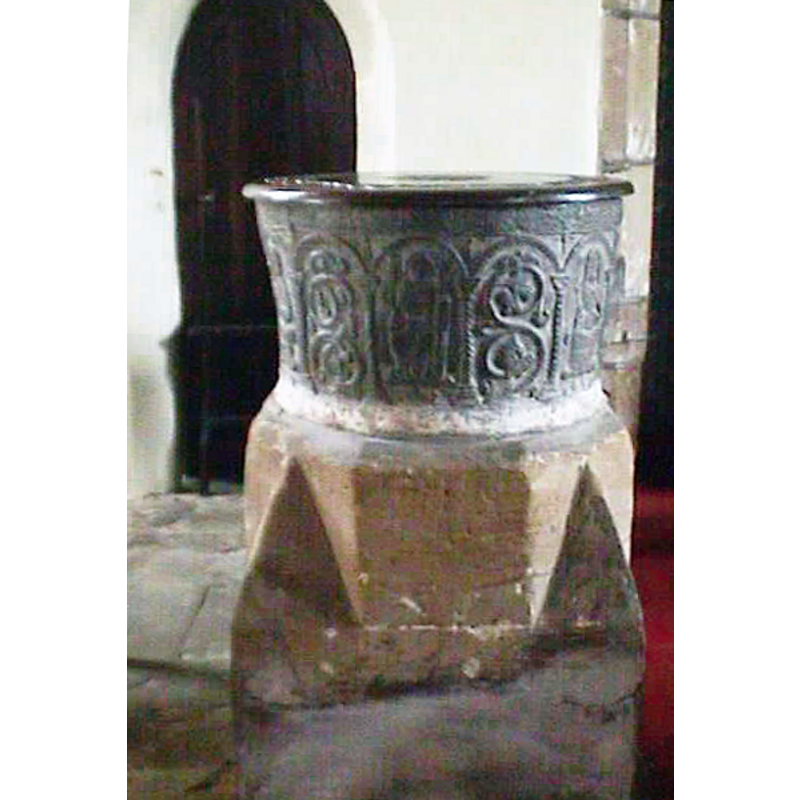
Image copyright © John Wilkes, 2007
Standing permission
Results: 14 records
view of font
view of basin and cover
design element - architectural - arcade - round arches
human figure
design element - motifs - plant or tree?
Christ? - right hand raised in benediction
design element - motifs - chevron
view of church exterior in context - north view
Copyright Statement: Image copyright © Philip Pankhurst, 2014
Image Source: digital photograph taken 26 April 2014 by Philip Pankhurst [www.geograph.org.uk/photo/3951401] [accessed 7 December 2018]
Copyright Instructions: CC-BY-SA-2.0
view of church exterior - southeast view
Copyright Statement: Image copyright © Philip Pankhurst, 2014
Image Source: digital photograph taken 26 April 2014 by Philip Pankhurst [www.geograph.org.uk/photo/3951453] [accessed 7 December 2018]
Copyright Instructions: CC-BY-SA-2.0
view of church exterior - southeast view
Scene Description: Source caption: "St Anne, Oxenhall. A 19th century church, by John Middleton of 1867-8, with an early 14th century tower which had a spire until 1971. The tip survives in the churchyard."
Copyright Statement: Image copyright © Philip Pankhurst, 2014
Image Source: digital photograph taken 26 April 2014 by Philip Pankhurst [www.geograph.org.uk/photo/3951494] [accessed 7 December 2018]
Copyright Instructions: CC-BY-SA-2.0
view of basin - projection
information
view of font and cover
INFORMATION
Font ID: 00366OXE
Object Type: Baptismal Font1
Font Century and Period/Style: 12th - 13th century, Late Norman / Transitional?
Workshop/Group/Artisan: lead font
Cognate Fonts: Frampton-on Severn, Siston, Tidenham, Lancaut and Sandhurst (Gloucestershire). All believed to be from the same mould.
Church / Chapel Name: Parish Church of St. Anne
Font Location in Church: Inside the church
Church Patron Saint(s): St. Anne
Church Address: Oxenhall, Newent GL18 1RH, United Kingdom
Site Location: Gloucestershire, South West, England, United Kingdom
Directions to Site: Located S of the M50, N of the A40, 2 km NNW of Newent
Ecclesiastic Region: Diocese of Gloucester
Historical Region: Hundred of Botloe
Font Notes:
Click to view
There is an entry for Oxenhall [variant spelling] in the Domesday survey [http://opendomesday.org/place/SO7126/oxenhall/] [accessed 7 December 2018] but it mentions neither cleric nor church in it. Lewis' Dictionary of 1848 notes: "a very remarkable and handsome font, of much greater antiquity than the church: the bowl is of lead, bearing a representation, in low relief, of the Redeemer, the right hand raised in the act of benediction, the left resting on a book; the bowl is Norman, the base in the decorated style." Described in Bond (1908) as a lead baptismal font, one of many fonts that had been assigned in the past a pre-Conquest [i.e., pre 1066 A.D.] by some; Bond argues that this font is not likely "to be earlier than the closing years of the twelfth or the early years of the following century". In Fryer (1908). In Gethyn-Jones (1979). Lead bowl resting on a stone base; the basin sides have an arcade whose arches have figures and foliage in alternate arches; one of the figures appears to be Christ with his right hand raised in benediction; the columns which make up the arches have chevron pattern ornamentation. Described and illustrated in Zarnecki (1957): "Although inspired by Mosan metalwork, these figures retain something of the style of Anglo-Saxon art". [cf. also Index entry for Frampton-on-Severn]. Noted in Verey & Brooks (1999-2002): "Font. One of the important Gloucestershire group of six late C12 lead fonts, with an arcade enriched with chevron, cable, and sunk pellet mouldings and containing six seated apocalyptic figures and six scrolls.The top band has rather damaged anthemions." The entry for this parish in the Victoria County History (Gloucester, vol. 12, 2010) notes: "Oxenhall church was probably of early Norman or pre-Conquest origin, for, unlike several neighbouring churches, there is no evidence that it originated as a chapel to Newent. The earliest surviving part of its fabric and fittings is a 12thcentury lead font. When first found recorded, in 1291, the church was in the possession of the Knights Hospitaller. [...] The 12th-century lead font is one of six which were cast from the same mould, probably in the Bristol area."
Credit and Acknowledgements: We are grateful to John Wilkes, of www.allthecotswolds.com, for the photographs of this font]
COORDINATES
UTM: 30U 539796 5754342
Latitude & Longitude (Decimal): 51.93837, -2.4211
Latitude & Longitude (DMS): 51° 56′ 18.13″ N, 2° 25′ 15.96″ W
MEDIUM AND MEASUREMENTS
Material: metal, lead
Number of Pieces: one
Font Shape: cylindrical, mounted
Basin Interior Shape: round
Basin Exterior Shape: round
Diameter (inside rim): 63.75 cm*
Basin Total Height: 55 cm*
Notes on Measurements: * [in inches in Fryer (1908: 281)]
LID INFORMATION
Date: modern
Material: wood
Apparatus: no
Notes: flat and round, with some carving ornamentation on the upper surface
REFERENCES
- Victoria County History [online], University of London, 1993-. URL: https://www.british-history.ac.uk.
- Bond, Francis, Fonts and Font Covers, London: Waterstone, 1985 c1908, p. 79
- Clayton, Brian C., "English Church Fonts of Ornamental Lead Work", X, no. 57, Apollo: a Journal of the Arts, 1929, pp. 133-138; p. 133-138
- Cox, John Charles, English Church Furniture, New York: E.P. Dutton & Co., 1907, p. 163
- Crossley, Frederick Herbert, English Church Craftsmanship: an Introduction to the Work of the Mediaval Period and Some Account of Later Developments, London: B.T. Batsford, 1941, p. 16
- Fryer, Alfred C., "The Gloucestershire fonts", 31(1908); 34(1911); 40(1917); 41(1918); 42(1920), Transactions of the Bristol and Gloucestershire Archaeological Society, 1908, 1911, 1920, pp. 31 (277-281); 34 (195-207); 40(39-56); 41 (27-35); 42 (69-88); p. 277-279, 281
- Gethyn-Jones, Eric, The Dymock School of Sculpture, London: Phillimore, 1979, ill. 57b
- Lewis, Samuel, A Topographical Dictionary of England, Comprising the Several Counties, Cities, Boroughs, Corporate and Market Towns, Parishes, Chapelries, and Townships, and the Islands of Guernsy, Jersey, and Man, with Historical and Statistical Descriptions [...], London: S. Lewis, 1831, [www.british-history.ac.uk/report.asp?compid=51200] [accessed 22 February 2007]
- Verey, David, Gloucestershire, London: Penguin Books, 1999-2002, vol. 2: 628
- Zarnecki, George, English Romanesque Lead Sculpture: Lead Fonts of the Twelfth Century, London: A. Tiranti, 1957, p. 10, 32 and fig. 31
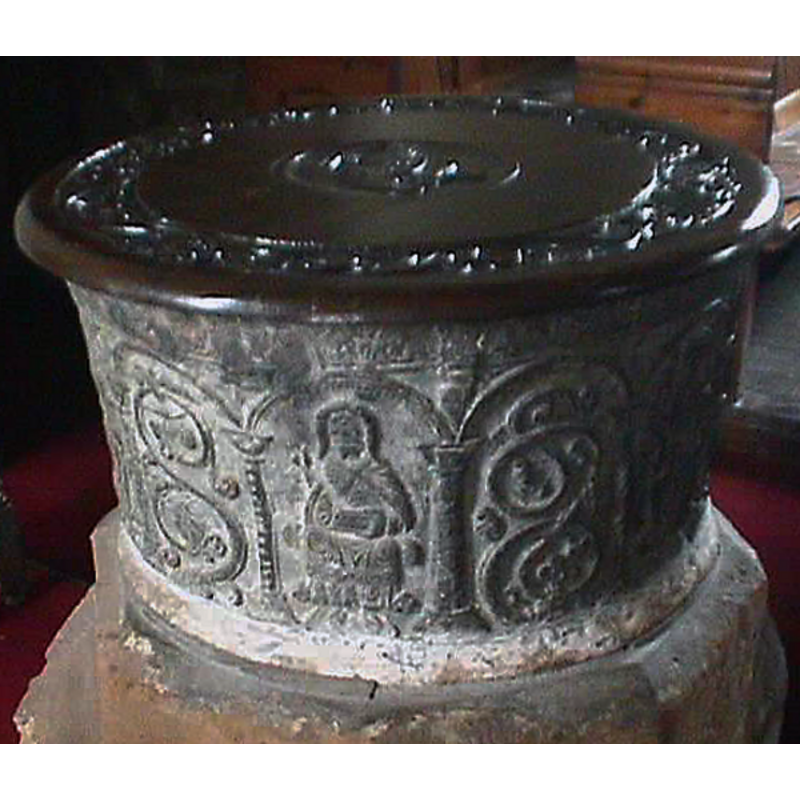
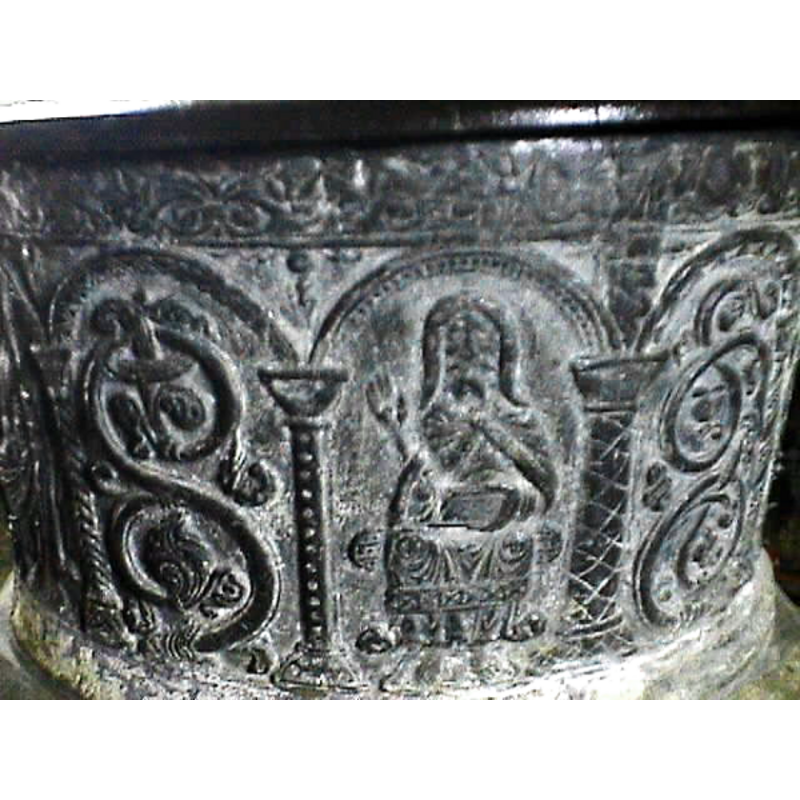
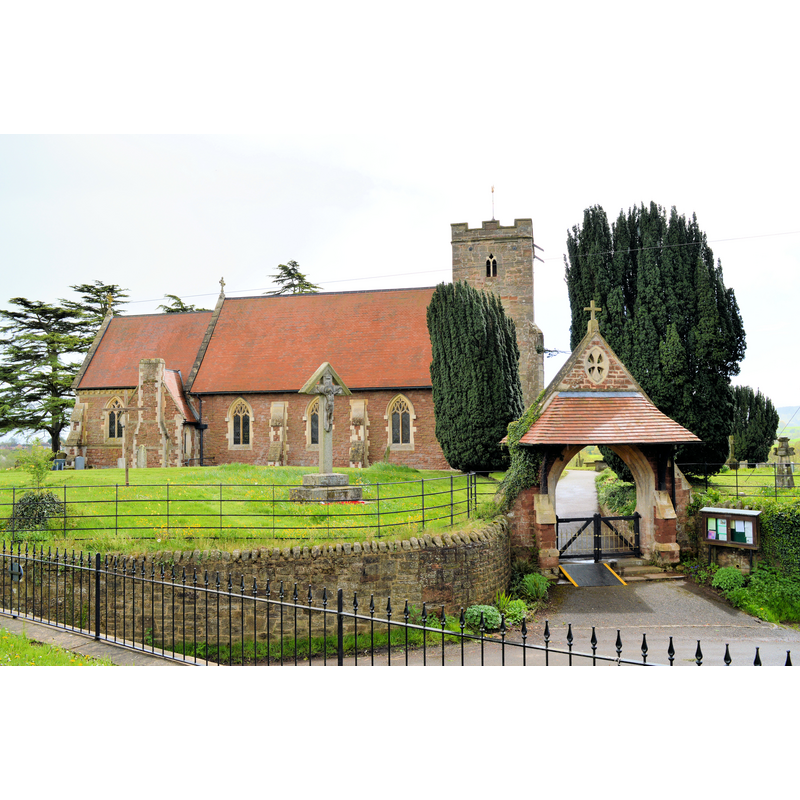
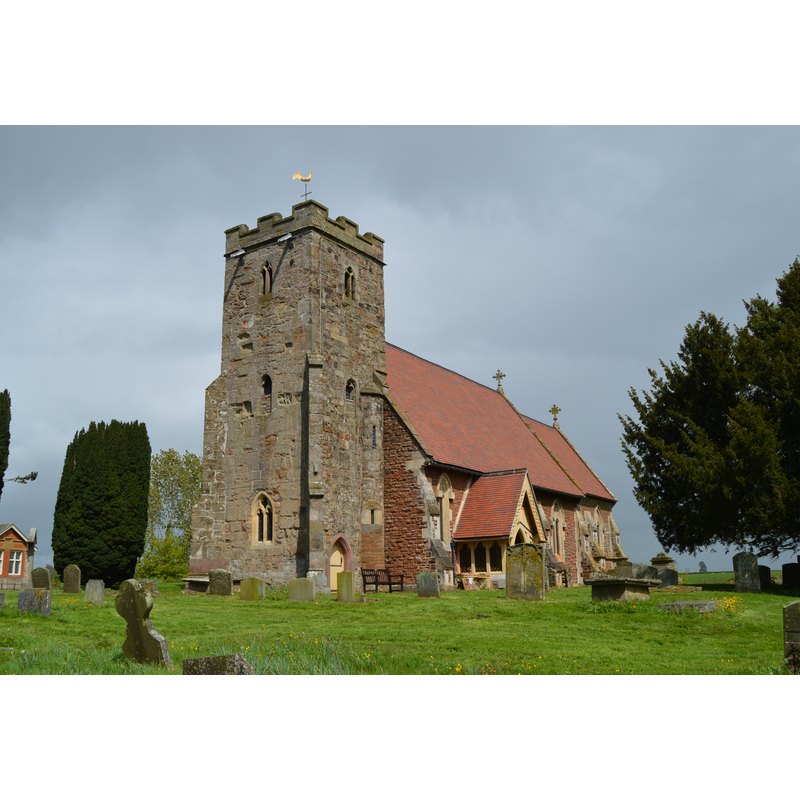
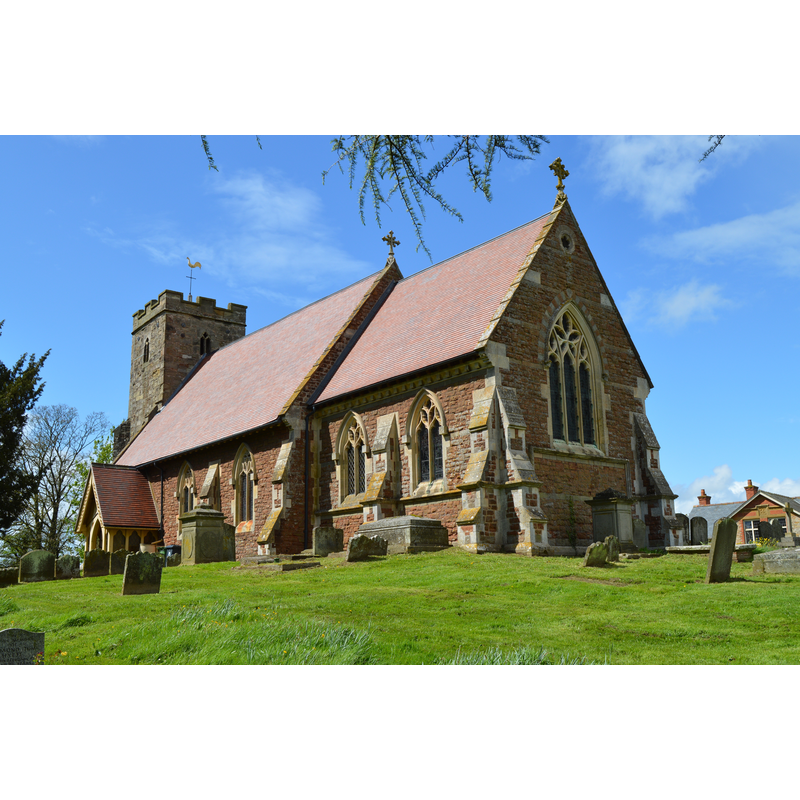
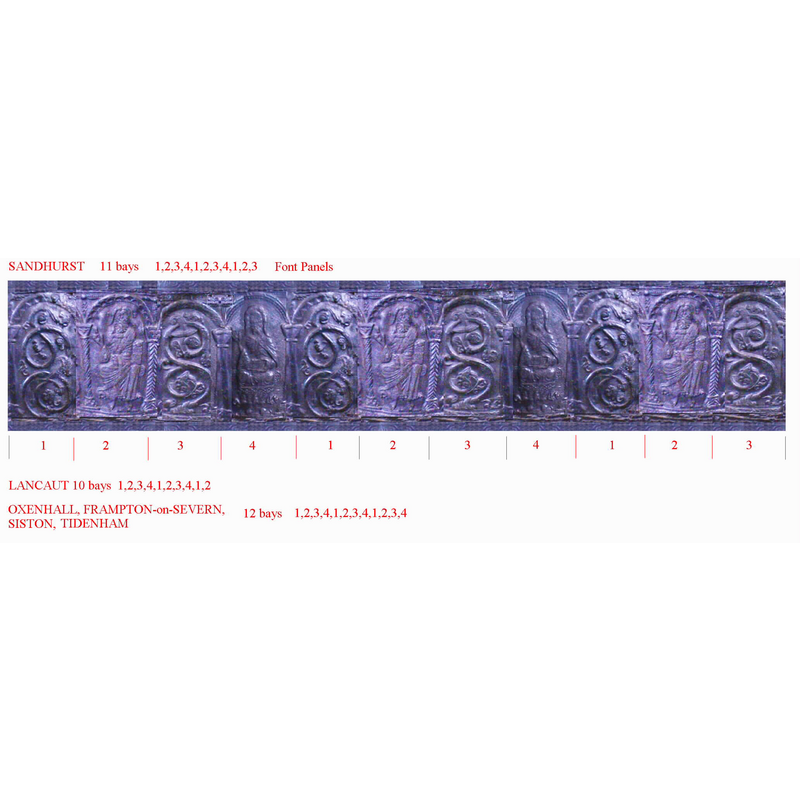
![[source not reported: probably church guide]](/static-50478a99ec6f36a15d6234548c59f63da52304e5/compressed/1070325006_compressed.png)
